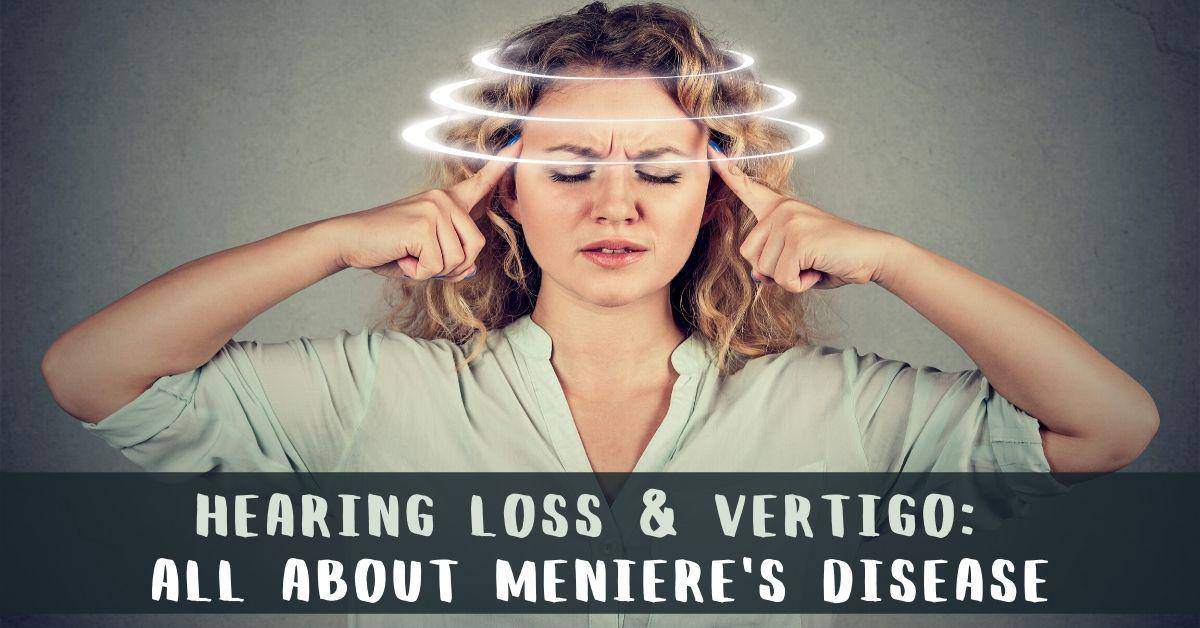
- How Spending Time Outdoors Enhances Hearing Health - July 16, 2024
- Exploring the Impact of Sports on Hearing Health - July 3, 2024
- The Impact of Diet on Hearing Loss - June 28, 2024
Dizziness and ringing in one ear accompanied by some degree of hearing loss could be symptoms of Meniere’s disease. A hearing health care professional can properly diagnose your condition and, begin treatment to help manage the symptoms.
Meniere’s disease was identified in the 1800s and named after the French doctor who discovered it. It is an inner ear disease that usually affects one ear and some symptoms include pressure or pain accompanied by dizziness or vertigo and hearing loss is also often present. A ringing, roaring, or clicking in the ears, called tinnitus, can sometimes affect people with Meniere’s disease, too.
Who is Affected by Meniere’s Disease?
Meniere’s disease can affect any age population, but people in their 40s and 50s are the demographic most likely to experience it. The condition is chronic and currently without a cure, but there are ways for Meniere’s to be treated, to both relieve symptoms and minimize hardship on your quality of life.
What Causes Meniere’s Disease?
Meniere’s is believed to be connected to increased pressure in the inner ear (which is full of fluid known as endolymph), though it is difficult to detect the exact cause. Primary idiopathic endolymphatic hydrops is another name for Meniere’s meaning abnormal fluid in the ear.
There are many factors that can be attributed to acquiring Meniere’s. The following are possible triggers or causes:
- Head injury
- Inner or middle ear infection
- Respiratory infection
- Allergies
- Alcohol use
- Smoking
- Stress or Anxiety
- Migraines
- Family history
- Recent viral illness
- Fatigue
- Side effects from some medications
Signs and Symptoms
Symptoms of Meniere’s disease vary with each person, but many people often experience a feeling of pressure in the ear, sudden dizzy spells, tinnitus, and muffled hearing or partial loss of hearing. Some people experience many attacks over several days and others may only have an isolated attack once in a while. In order to diagnose the disease, you must have tinnitus, hearing loss, and vertigo more than once. Meniere’s can be tricky to diagnose because all of the symptoms can stand alone as medical conditions or be comorbidities of other diseases.
Typically, symptoms begin with feeling pressure in the ear, followed by tinnitus, hearing loss, then vertigo. These episodes are often experienced as a collection of episodes followed by long remission periods and can last between 20 minutes to four hours. During an episode, it is best to lie down and focus on a still object. Many people report feeling better after a nap.
Hearing Loss and Meniere’s Disease
Meniere’s disease has been shown to cause hearing loss, particularly low-frequency hearing loss. This common and often uncomfortable is a type of hearing loss in which low-pitched sounds—like men’s voices or bass in music—are harder to hear. There are some instances where higher-pitched sounds are uncomfortable to hear, but this is typically reversible and goes away. In this way, Meniere’s disease is unpredictable, wherein the hearing loss can affect low- or high-frequency sounds.
In some cases, people develop more serious degrees of hearing loss. These range from mild to profound and can generally be treated with hearing aids since it is classified as a sensorineural hearing loss.
The stages of Meniere’s usually develop over time and affect people differently.
- Early stage – During this stage, a person will experience sudden and spontaneous episodes of vertigo that last anywhere from 20 minutes to an entire day. A person’s ear may feel blocked or full, resulting in possible hearing loss, which typically goes away after the episode. It is also common to feel the effects of tinnitus, a ringing, roaring, or clicking in the ear.
- Middle stage – Symptoms of vertigo tend to become less severe during this stage, while hearing loss and tinnitus will increase in severity. Many people will also experience long-term remission—during which time the disease goes away—that can last several months.
- Late stage: During the late stages of Meniere’s disease, patients will not suffer from vertigo as often, and some people will be relieved from it permanently. However, tinnitus and hearing loss often progressively gets worse, and people will likely experience unsteady balance regularly. Most people at this stage feel unstable in dark conditions.
Relief from Home Remedies
Various home remedies can help to control Meniere’s disease, though none of them have been studied at length to measure the effects. Diet and lifestyle changes may show effects like decreasing the fluid levels in the inner ear and helping combat vertigo and dizziness, and these changes can benefit your overall health, too.
Drinking less caffeine can lessen the severity of tinnitus and reducing salt intake can prevent the body from retaining fluids. Many people have reported relieved symptoms after they have given up smoking, and working to manage stress and anxiety can prevent exacerbated symptoms of Meniere’s.
Medical Treatments
There are few medical treatments due to the need for more study, but two inner ear injections have seen clinical trial success: gentamycin, an antibiotic that helps with dizziness; and steroids to combat inflammation.
Other, less-studied treatments include: medications that treat dizziness; diuretics that treat fluid retention; and lastly, surgery to reduce inner ear pressure and fluid. Check with your hearing health care professional to see what options are best for you.
